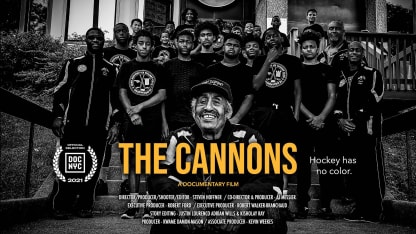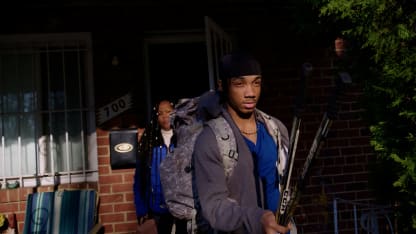"I guarantee you there's no other hockey club like Fort Dupont."
"Coach Neal" and many others have delivered on that promise for 45 years. Their story is the subject of "The Cannons," a documentary debuting Sunday at the DOC NYC film festival in New York. It chronicles the longest-running minority hockey club in North America, what director Steven Hoffner calls "a sanctuary in a lighthouse" from Wards 7 and 8, one of the toughest neighborhoods in the United States.
"They learn to be men and women," Hoffner said. "When you walk in those doors at Dupont, it's not just about the game of hockey. It's about life."
Their mentor is Henderson, an 84-year-old former semipro player and Air Force veteran, and a 2019 inductee into the U.S. Hockey Hall of Fame who promotes Fort Dupont as a family. That was enough for Hoffner, who worked for the NHL in video production for more than a decade, to fund the project with much of his own money. He teamed with co-director AJ Messier, who was a 14-year-old youth player when he first saw Black kids playing hockey while competing at a tournament in Port Huron, Michigan.
Messier, now 46, learned a lesson from his coach: Those seven kids on the opposing team were players his age who put on their skates and pants the same way as everyone else. He said that resonated during filming and that he learned quickly he never saw anything like Fort Dupont.
"Showing up in D.C. with Steve, I saw a bunch of kids that didn't look like me, but I knew that they were doing the same calisthenics, the same drills," Messier said. "Watching them out on the ice, that's kind of when I realized that it was a different program."
The film honors the present with the spotlight on teenagers Robert Lynch and Rayvon Hall and their dreams of becoming a police cadet and playing college hockey, respectively. It also follows alumnus and assistant coach Ralph Featherstone, a teen in the 1990s who learned to play and attended the U.S. Naval Academy, being named captain of the men's hockey team there as a senior. He became a lieutenant colonel, was assigned to San Diego and now serves on the Joint Staff at the Pentagon, where he can devote more time and energy to the club.
"Fort Dupont definitely set the foundation for my success at Navy on and off the ice," Featherstone wrote in an email. "I'm very proud of this film and happy that I have had the opportunity to be a part of its making. It shines a light on the great things that go on in our program, for which I am very grateful. As we continue to serve our community, we hope this exposure will help grow the program to introduce ice hockey to more youth throughout the city."
Former Fort Dupont player Duante' Abercrombie, an assistant coach at Stevenson University in NCAA Division III, said Henderson and the Cannons allowed him to believe that hockey is his sport as much as anyone else's.
"There haven't been many Black coaches at the NCAA level, but I never saw my color as a barrier to entry thanks the great example that Coach Neal set," Abercrombie wrote in an email. "I truly would not be in the position I currently am as a coach without them. Fort Dupont is not just a hockey team. It is an escape from whatever may be waiting for the players at home."



